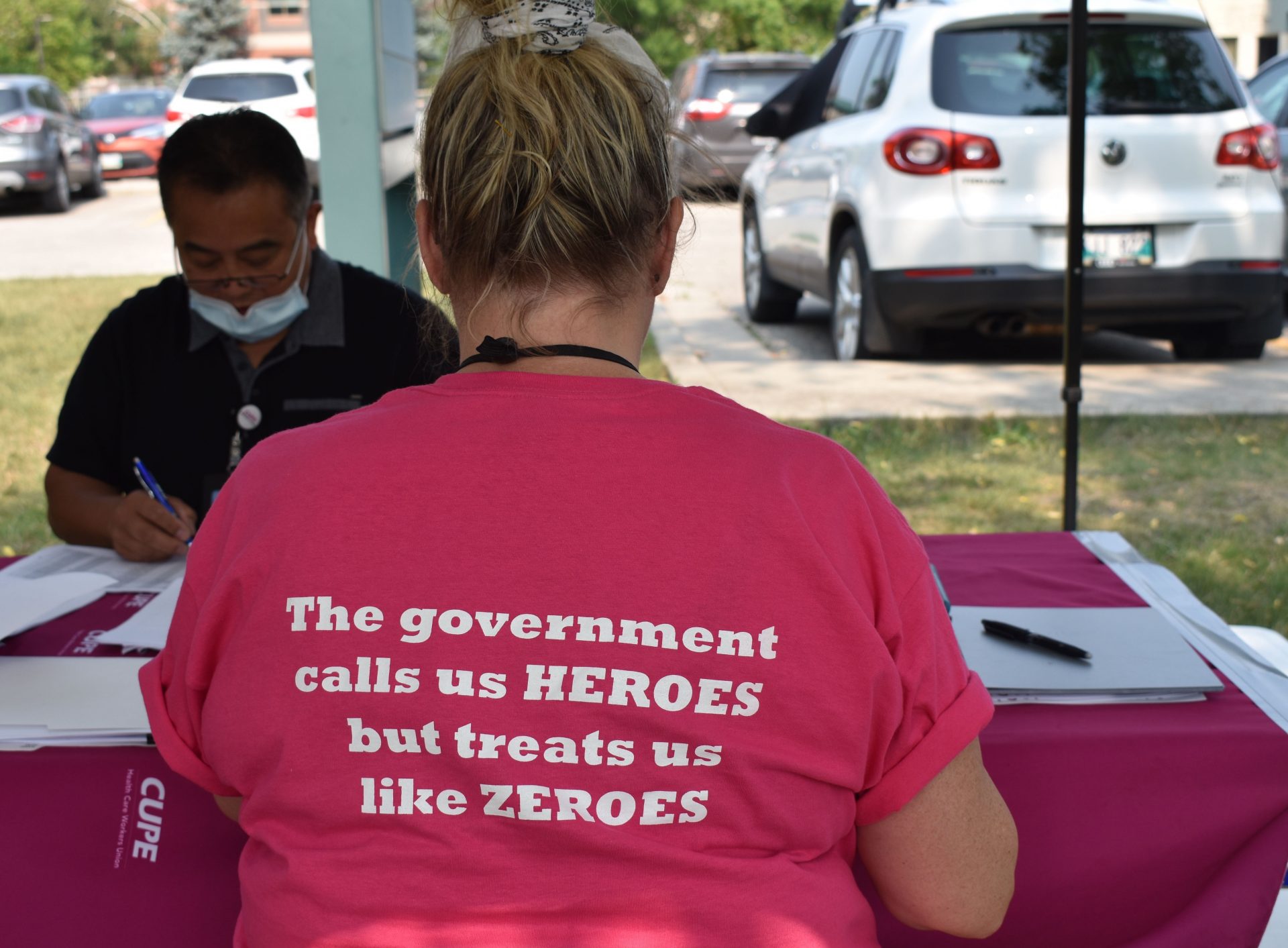After four to five years without contracts, Manitoba health-care support staff have voted for strike action. With 97% on favour, the workers are ready to fight. If the Manitoba PCs will not provide their health-care support staff with more than words of praise, the workers should strike to win it.
These workers work for Shared Health, the Winnipeg Regional Health Authority (WRHA), the Northern Regional Health Authority (NRHA) and Southern Health-Santé Sud (SH-SS) in Manitoba. The vote count in favour of strike action is as follows:

- Workers from Shared Health (CUPE 500) and WRHA (CUPE 204) voted 99 per cent in favour of strike action.
- Workers at NRHA (CUPE 8600) voted 98 per cent in favour of strike action.
- SH-SS (CUPE 4270) voted 92 per cent in favour of strike action.
Workers represented by CUPE locals 500, 204, 8600 and 4270 include health-care aides, clerical staff, biomedical engineers, and staff working dietary, laundry, trades and maintenance—people who are absolutely critical to ensuring health-care facilities are functioning and who ensure doctors and nurses can perform their jobs efficiently. These workers, who have been working without a contract since 2017, are demanding protections for benefits and pensions, wage increases and improvement to rules around safe working conditions. The demands of Manitoba health-care workers are more than reasonable; for the government to deny these demands shows their disregard for public health care, workers, and safety.
Lee McLeod, CUPE Manitoba regional director, had this to say about the situation: “Health care support staff have been fighting on the front lines to keep our communities safe during the COVID-19 pandemic, while also enduring the Pallister government’s drawn-out attacks on health care. Support staff are the pillars of health care, but are being treated as if they don’t matter—and that is unacceptable.” Discussions with the employers are scheduled to resume this fall. Union leaders are optimistic that the strike mandate will provide the leverage needed to move discussions in their favour. In 2017, when the contracts expired for the members of CUPE locals 500, 204, 8600 and 4270, the Manitoba Progressive Conservative (PC) government rammed through wage freeze legislation and grouped dozens of contracts, forcing many workers to go years without an agreement.
Unfortunately, Conservative governments across Canada have continued to enact anti-union laws under the guise of essential services or protection of “critical infrastructure”, undermining workers’ right to strike. With the threat of job loss, fines, or jail time, workers have been deterred from exercising their right to strike. Time and time again, governments attempt to claw back wages and pensions while increasing workloads for health-care workers. The ongoing attempts to cut spending on health care not only hurts health-care workers, but undermines the entire health-care system, impacting everyone.
CUPE is the largest union in Canada with 700,000 members, over 166,000 of which work directly within the healthcare sector. In the event of a strike, CUPE must mobilize their members from across the country to fight alongside their brothers and sisters from locals 500, 204, 8600 and 4270 to ensure their demands are met. A call to mobilize the entire labour movement nationwide is also essential to push back against the Manitoba government’s blatant disregard for health-care workers and shine light on these continued attacks on working-class people. This struggle has the potential to set the tone for workers across the country.
The government attack on health-care workers and support staff is not isolated to one province but happening across the country. Hundreds of thousands of health-care workers from every province and territory are facing poor working conditions, wage cuts, and layoffs. All over the country there is an exodus of nurses from the profession, causing nursing job vacancies to rise 40 per cent since the pandemic began. The most prevalent of these attacks are happening in Alberta, where Jason Kenny and the UCP have asked nurses to take a five per cent pay cut after being forced to cancel scheduled time off and work mandatory overtime. They are also privatizing 11,000 health-care jobs while the pandemic has now reached a point where hospitals are grossly understaffed. And instead of rehiring staff who have been laid-off, the government is contracting the required positions to private health-care providers, often out of province. Nurses have borne the brunt of the pandemic and are willing to fight. The Canadian Federation of Nurses Unions has organized a national day of action on Friday, Sept. 17 which will surely demonstrate this anger and push the envelope for the struggle of health-care workers generally.
As Manitoba moves into a fourth wave of the COVID-19 pandemic, a clear message has been sent to the Manitoba government. Health-care workers must be compensated for their sacrifices or the PCs will face disruption. After putting their lives at risk fighting on the front lines of the battle with COVID-19, health-care support staff are frustrated and exhausted. Politicians were quick to publicly praise health-care workers and support staff for their hard work but have not provided these workers with any form of compensation. Working-class people employed in the health-care sector have risked their lives going to work during these unprecedented times; many unnecessarily lost their lives. If the Manitoba PCs will not provide their health-care support staff with more than words of praise, the workers should strike to win it.

